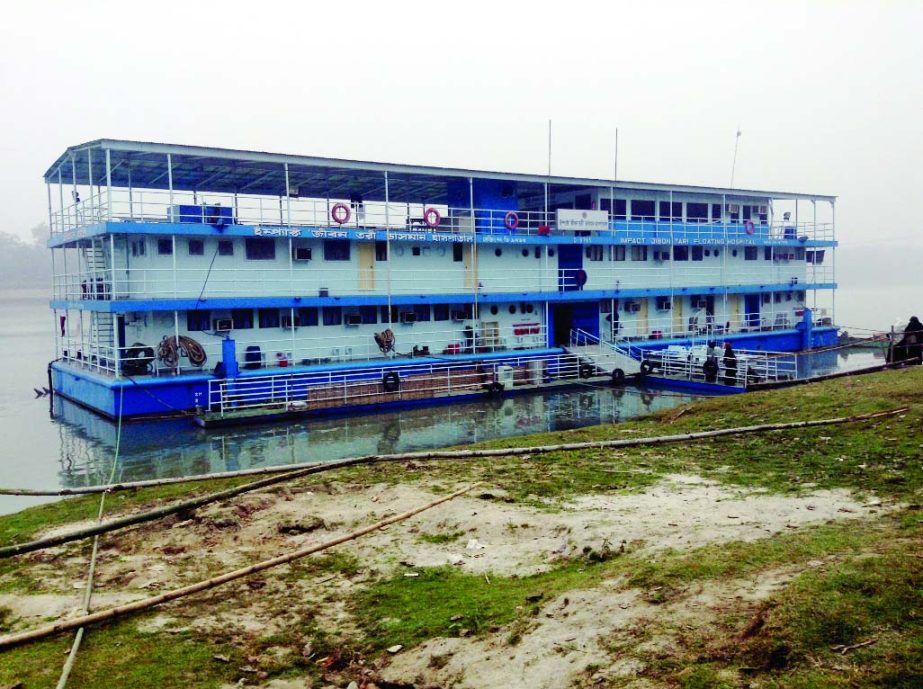
On a small dirt path along a riverbank in Bangladesh, throngs of people gather around desks arranged under bamboo canopies. Clutching pink slips in their hands, these people have come to visit the impressive structure that is docked in the river: the Jibon Tari, a floating hospital.
Standing three storeys high and painted shades of blue, the Jibon Tari is the pride of the IMPACT Foundation Bangladesh. “The floating hospital is for those who cannot afford healthcare or cannot travel to hospitals. If they cannot go to a hospital, we shall bring the hospital to them,” says Dr. Hasib Mahmud, Director. The Jibon Tari sails around central and southern Bangladesh and docks in areas for months at a time in order to provide healthcare for the underprivileged. “It is very affordable,” says Dr. Md. Mahbub Hossain, Administrator at Jibon Tari. “Patients must only pay Tk 30 (0.38 USD) for registration, and procedures at the hospital can range from being free of charge, to costing around Tk 2,500 (32 USD).”
The three storeys hospital, ventilated by the fresh river breeze, is outfitted with examination rooms, surgery chambers, patient housing quarters, as well as lodging for medical staff. “We have around 30 full time staff here, but doctors from around the world have to stay at the
Jibon Tari and treat patients. We have had doctors from the UK, the USA, Thailand and Nepal to treat our patients,” says Dr. Hossain. The hospital is equipped for dealing with specific maladies, namely eye problems and congenital birth defects. The most common procedures are cataract surgery and cleft lip surgery.
Patients come to the Jibon Tari to receive primary health care and treatment. If further treatment is needed, they are referred by the Jibon Tari doctors to other hospitals, such as the National Institute of Ophthalmology at Shyamoli, Bangladesh.
The Jibon Tari, meaning “life boat” in Bengali, travels mainly around central and southern Bangladesh. “Unfortunately, the areas we can work in are limited. We cannot travel to Chittagong, because salt water camses damage to the ship. Also, we cannot travel to the northern areas of Bangladesh because we need powerful engines to do so, which our ship is not equipped with,” states Dr. Mahmud. However, wherever the ship docks, it makes a large impact within the surrounding community. Fifty to 100 patients per day are treated at the hospital, which remains anchored in a given area for six months or more at a time.
“The Jibon Tari is just one of our projects here of the IMPACT Foundation,” says trustee Dr. Rezaul Haque. “It has definitely made great progress in Bangladesh, and brought us one step closer to nationwide health care.”
Olivia VF Chaudhury
Standing three storeys high and painted shades of blue, the Jibon Tari is the pride of the IMPACT Foundation Bangladesh. “The floating hospital is for those who cannot afford healthcare or cannot travel to hospitals. If they cannot go to a hospital, we shall bring the hospital to them,” says Dr. Hasib Mahmud, Director. The Jibon Tari sails around central and southern Bangladesh and docks in areas for months at a time in order to provide healthcare for the underprivileged. “It is very affordable,” says Dr. Md. Mahbub Hossain, Administrator at Jibon Tari. “Patients must only pay Tk 30 (0.38 USD) for registration, and procedures at the hospital can range from being free of charge, to costing around Tk 2,500 (32 USD).”
The three storeys hospital, ventilated by the fresh river breeze, is outfitted with examination rooms, surgery chambers, patient housing quarters, as well as lodging for medical staff. “We have around 30 full time staff here, but doctors from around the world have to stay at the
Jibon Tari and treat patients. We have had doctors from the UK, the USA, Thailand and Nepal to treat our patients,” says Dr. Hossain. The hospital is equipped for dealing with specific maladies, namely eye problems and congenital birth defects. The most common procedures are cataract surgery and cleft lip surgery.
Patients come to the Jibon Tari to receive primary health care and treatment. If further treatment is needed, they are referred by the Jibon Tari doctors to other hospitals, such as the National Institute of Ophthalmology at Shyamoli, Bangladesh.
The Jibon Tari, meaning “life boat” in Bengali, travels mainly around central and southern Bangladesh. “Unfortunately, the areas we can work in are limited. We cannot travel to Chittagong, because salt water camses damage to the ship. Also, we cannot travel to the northern areas of Bangladesh because we need powerful engines to do so, which our ship is not equipped with,” states Dr. Mahmud. However, wherever the ship docks, it makes a large impact within the surrounding community. Fifty to 100 patients per day are treated at the hospital, which remains anchored in a given area for six months or more at a time.
“The Jibon Tari is just one of our projects here of the IMPACT Foundation,” says trustee Dr. Rezaul Haque. “It has definitely made great progress in Bangladesh, and brought us one step closer to nationwide health care.”
Olivia VF Chaudhury

